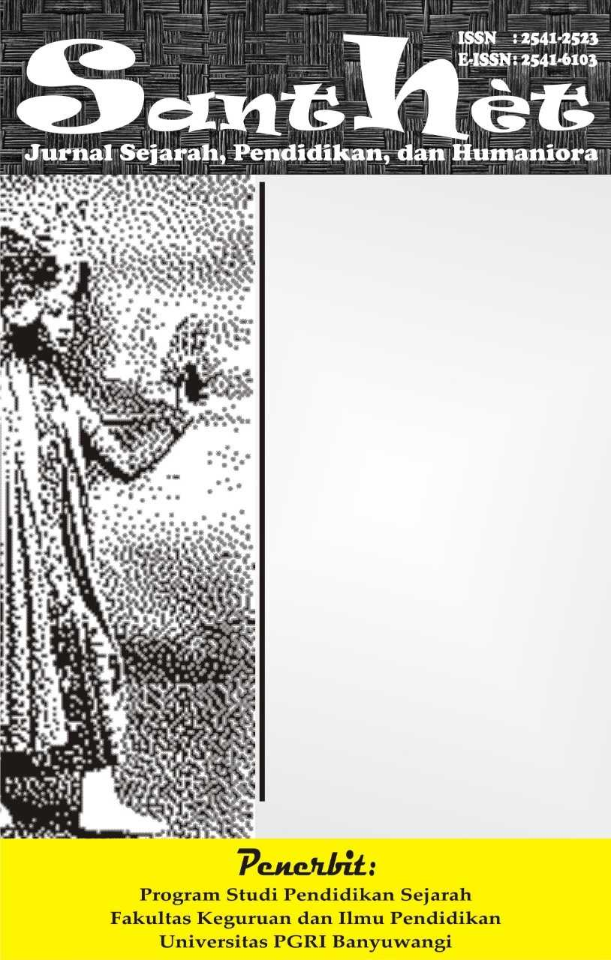PEOPLE'S PERCEPTION OF THE MYTH OF "KEPUNAN" IN BANGKA BELITUNG ISLANDS PROVINCE
PERSEPSI MASYARAKAT TERHADAP MITOS “KEPUNAN” DI PROVINSI KEPULAUAN BANGKA BELITUNG
DOI:
https://doi.org/10.36526/santhet.v7i2.3242Keywords:
Myths, Kepunan, People's PerceptionsAbstract
This study aims to determine the people's perception of the myth of "kepunan" in the Bangka Belitung Islands Province. This research method uses descriptive qualitative with triangulation techniques, namely observation, interviews, and documentation. The sampling technique uses Purposive sampling. The object of research in the Bangka Belitung Islands Province, where the myth is still developing and believed in, is the myth of "kepunan.” This myth is viewed from three aspects: cultural views, religion, and the younger generation. These three aspects became the basis for obtaining the results of this study. First, the myth of " kepunan " is part of the culture and customs of local peoples passed down from generation to generation from ancestors. Most local people believe in the myth of "kepunan" and think that there is something terrible that comes if they ignore the myth. Other minority groups believe the myth of "kepunan" is an ancestral heritage that needs to be maintained as local wisdom in Bangka Belitung. Second, the group of scholars believes that the myth of " kepunan " is only a mere superstition, unacceptable with logic, and cannot be accounted for its truth, so the myth cannot be connected with religious rules. Third, the younger generation's view of this "kepunan" myth has begun to diminish because environmental factors influence it. Where the younger generation of the local people of Bangka Belitung worked a lot in the city, so slowly, the myth of "kepunan" began to fade.
References
Yulianthi, Ilmu Sosial Budaya Dasar, Sleman: Deepublish, 2015.
R. West and L. H. Turner, Pengantar Teori Komunikasi, Edisi 3, Jakarta: Salemba Humanika, 2008.
D. Sutrisman, Pendidikan Politik, Persepsi, Kepemimpinan, dan Mahasiswa, Bogor: GUEPEDIA, 2019.
N. Supriatna, M. Ruhimat and K. , Ilmu Pengetahuan Sosial (Geografis, Sejarah, Sosiologi, Ekonomi), Bandung: PT. Grafindo Media Pratama, 2006.
B. Supriadi and N. Roedjinandari, Perencanaan Dan Pengembangan Destinasi Pariwisata, Malang: Universitas Negeri Malang, 2017.
P. Suparno, Riset Tindakan Untuk Pendidik, Jakarta: PT Grasindo, 2008.
Sugiarto, T. Hendratono and D. Sudibyo, Metodologi Penelitian Hospitality & Pariwisata, Tangerang: PT Matana Publishing Utama, 2015.
Sudaryono, metodologi penelitian, depok: rajawali pers, 2018.
G. R. Somantri, "Memahami Metode Kualitatif,," Makara, Sosial Humaniora, VOL 9, NO 2, Desember 2005, pp. 57-65, 60, 2005.
S. Siyoto and A. Sodik, Dasar Metodologi Penelitian, Yogyakarta: Literasi Media Publishing, 2015.
T. Rosmana, Mitos Dan Nilai Dalam Cerita Rakyat Masyarakat Lampung, Bandung: Balai Pelestarian Sejarah dan Nilai Tradisional Bandung, 2010.
Y. Piliang, Tafsir Cultural Studies Atas Matinya Makna, Yogyakarta: Jalasutera, 2008.
Parek, Metode Belajar Dan Kesulitan-Kesulitan Belajar, Bandung: Tarsito, 1984.
I. Nurdin and S. Hartati, Metodologi Penelitian Sosial, Surabaya: Penerbit Media Sahabat Cendikia, 2019.
Murhato and A. Ambarita, Metodologi Penelitian Informasi; Mengatasi Kesulitan Mahasiswa Dalam Menyusun Proposal Penelitian, Sleman: Deepublish publisher, 2016.
Morissan, Metode Penelitian Survei, Jakarta: PT Fajar Interpratama Mandiri, 2017.
I. Kusmayadi, D. A. Fitria and E. Rahmawati, Be Smart Bahasa Indonesia, Bandung: Grafindo Media Pratama, 2008.
L. A. King, Psikologi Umum (Sebuah Pandangan Apresiatif), Jakarta: Salemba Humanika, 2010.
I. Hermawan, Metodologi Penelitian Pendidikan Kuantitatif, Kualitatif, Dan Mixed Methode, Kuningan: Hidayatul Quran Kuningan, 2019.
A. Hamdani, Konvergensi, Surakarta: CV Akademika, 2018.
M. Fitrah and Lutfiyah, Metodologi Penelitian; Penelitian Kualitatif, Tindakan Kelas & Studi Kasus, Sukabumi: CV Jejak, 2017.
A. Elvian, Kampung Di Bangka Jiliid I, Pangkalpinang: CV. Talenta Surya Perkasa, 2016.
J. Dimyati, Metodologi Penelitian Pendidikan Dan Aplikasinya Pada Pendidikan Anak Usia Dini (PAUD), Jakarta: PT Fajar Interpratama Mandiri, 2013.
J. Danandjaya, Foklor Indonesia, Jakarta: Pustaka Utama Grafiti, 2002.
R. Barthes, Membedah Mitos-Mitos Budaya Massal: Semiotika Atau Sosiologi Tanda, Simbol, Dan Representasi, Yogyakarta: Jalasutera, 2007.
N. Anshory, Strategi Kebudayaan : Titik Balik Kebudayaan Nasional, Malang: Universitas Brawijaya Press (UB Press), 2013.
G. I. and D. , Organisasi: Struktur, Perilaku, Proses., Jakarta: Erlangga, 1996.
A. and S. , Pembelajaran Sejarah Kebudayaan Islam, Cirebon: Ebooksia Publisher, 2018.





























